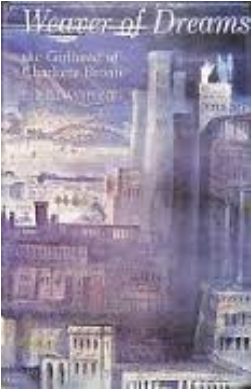 Click here to Last Sunday, driving back to Derbyshire from Chester, I caught Open Book on Radio 3 with Matt Haig talking to Mariella Frostrup about the book that changed his life – Jennie, by Paul Gallico. He spoke of how this touching story about a boy who has an accident, goes into a coma, and then awakens as a cat, had a profound influence on his recovery from depression. Recalling the sweet power of Gallico’s writing in The Snow Goose, I’ve decided that Jennie is a book I must read. As I drove over the rainy hills of Staffordshire, the interview made me think about the first book I remember changing my life. I was on the cusp of adolescence between primary school and high school, and it was early summer. My father, on returning from a fishing trip, gave me a book called Weaver of Dreams, by Elfrida Vipont. I remember him explaining it was about three sisters who wrote novels and became very famous, and their unfortunate brother, who had showed early promise, then failed to live up to everyone’s expectations. It was a slim green hardback with a dust jacket of an ink painting of a turreted city, reminiscent of the work of John Piper. I began reading it the same day. Weaver of Dreams is a fictional biography of Charlotte Bronte between the ages of four and eighteen, and I couldn’t put it down. Charlotte’s early life, her closeness to her two older sisters, Maria and Elizabeth, who were subjected to cruel treatment and then died at Cowan Bridge School, her return to the parsonage in Haworth, and the unfolding richness of her imaginary world shared with Emily, Branwell and Anne, were brought vividly to life. I was enchanted, and the book was passed round all my friends over the summer months of 1977. I went on to read all the Bronte novels, as many biographies as I could discover, and to learn much of Emily’s poetry by heart. It was Emily I was most in love with, strange, silent Emily, who I later discovered lit up many young lives. For three years I lived a kind of romantic life fuelled by her longing for the Yorkshire moors. Born and living in the city, I too longed for the wildness of the countryside, found city life oppressive and depressing. All my diaries of the time talk of my need for freedom. I’ve scarcely written a poem since, but I became adept at Bronte pastiche, and wish I’d kept those school exercise books, where my English teacher, Mr Smith, had given me top marks and rave reviews. My best friend, Vivien, and I wrote gothic stories set on heather-clad moors, and exchanged notes in tiny handwriting, like the books written by the Bronte children. I took myself extremely seriously in a way only possible during adolescence – and whilst it seems amusing now, I know that in some way I was sustained by those three extraordinary sisters during my own troubled years – the poetic power of their imaginary world, their isolation, their writing.
0 Comments
Leave a Reply. |
AuthorTricia Durdey dances, writes, and teaches Pilates. Archives
October 2017
|
 RSS Feed
RSS Feed